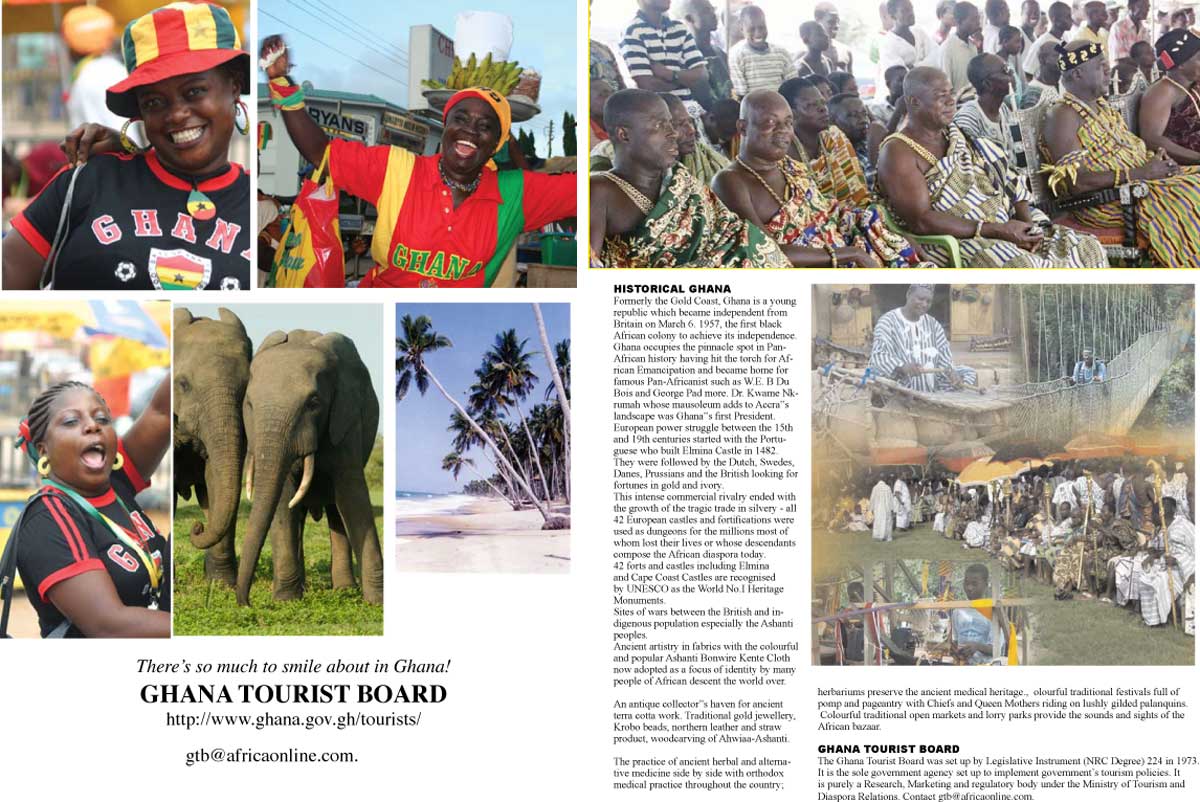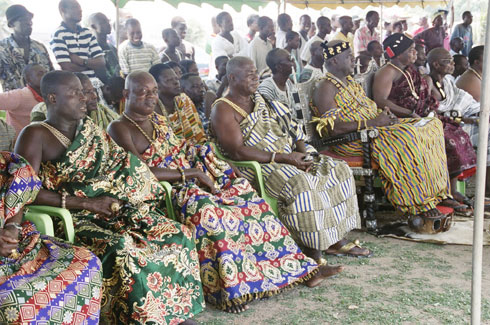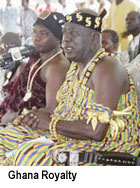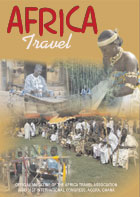



|
GHANA
GRAND
TOUR Elmina
and Cape Coast castles:
Scattered
along Ghana's Atlantic Coast are 26
historic stone and concrete structures,
built over 400 years ago by the Europeans
. Originally intended as trading posts,
they ended up as slave dungeons for
millions of Africans, captured and forced
into slavery. Many dungeons have been
restored to their original form, as
testimonials to the drama and tragedy of
human encounter. The slave castles of
Elmina (above) and Cape Coast, are two
recently designated as World Heritage
monuments. Together with the Dubois
Memorial Center for Pan African Culture in
Accra, they crystallize the African
experience of slavery, partition,
colonialism, racism and the struggle for
independence, emancipation and human
rights. Home
Away From Home:
Over
600 hotels provide courteous service that
reflects the near legendary hospitality
and traditions of Ghanaians. Government
incentives have fueled a boom in privately
owned tourist infrastructure. About 40 per
cent of the country's hotel capacity is in
Accra, which also has most of the 3 to 5
star hotels. The Labadi Beach Hotel,
Golden Tulip, Novotel and Wangara are
popular choices. Shangri La in Accra,
Sanaa Lodge and the Savoy, all in Cape
Coast, are known for their superior guest
service. Most hotels are located within
sights of picturesque beachheads and
landscapes, or flush in the center of the
host city's business and commercial
distinct. Novotel, an outstanding five
star hotel of sheer luxury, is minutes
away from the Accra International
Conference Center, National Theater, Ghana
Stock Exchange, Bank of Ghana, Government
Ministries Complex and the historic
'Makola Market,' which offers a
distinctively African experience in the
art of trade by higgling and
haggling. Sunshine,
Beaches and Greenery:
Close
to 600 km of unspoiled sun drenched
beaches, shaded by tall coconut trees,
await the traveler who desires to soak in
the sun of tropical Africa. Ghana is a
beach lover's paradise, with 12 hours of
bright sunshine all year round. Sports
fishing from indigenous canoes, or
visiting historic castles along the coast
by boat, (especially on clear moonlit
nights) is a trip into
wonderland.
Few
places in the world can compare with the
beauty of Ghana's natural environment. The
Mole Game Reserve in Northern Ghana
provides a thrilling encounter with rare,
exotic birds, bush cows, reptiles,
baboons, hippopotamus, elephants,
antelopes and the lion, king of the
jungle, The Kakum National Park has
Africa's only canopy walkway, (fourth
highest in the world) that enables the
more adventurous to enjoy the panoramic
view of indigenous flora and fauna as they
literally walk among tree tops reaching
heights of over 40 meters. Then there's
the Aburi Botanical Gardens, tucked away
in the cool mountains of Akuapem, near
Accra. Built over 100 years ago, Aburi's
well-kept plant reserve provides a
soothing venue for research and
relaxation. A visit to Boti Waterfalls,
framed by a rainbow after each rainfall,
and the Wli and Kintampo, provides a
sobering appreciation nature's
wonders. Seventeen
million people, whose home is this land of
legends and traditions, live by a
remarkable cultural code of conduct.
Alongside growing modernization and a
sensible governmental approach to
development, many ancient African
traditions and crafts flourish. To find
this land is to find natural beauty,
century old trades, like goldsmithing,
advanced indigenous political systems,
colorful festivals, and a fusion of
vibrant music and dance, drawn from over
90 ethnic groups. Ghana is a melting pot,
where many African ethnic cultures have
mixed with numerous European influences,
to produce a fascinating assortment of the
best traditions of hospitality and
architectural legacy. A
Taste of West
Africa:
Restaurant dining provides a comforting
serving of typical American, Continental
or oriental cuisine for the discriminating
traveler and equally delicious assortment
of local courses for the bold and
adventurous. The Golden Tulip Hotel is
especially famous for its variety of foods
especially made for special occasions; New
Year's Day Brunch, Mothers and Valentine
Days Dinner - and believe it or not,
Balkan Festival Dinner, when Hungarian and
Rumanian delicacies are served. Flashback:
Ghana Ashanti Coronation
Ceremonies Editor's
note: Two ATA members from the USA, Elyse
White and Freddye Henderson, were
enstooled in the last two years.
Photos: Above (left to right): Ellen
Posell, ATA SoCal Board member,
Screenwriter Avery Williams, Marlene Davis
& Eunice Rawlings, ATA SoCal Board
members. Asantehene
Otumfuo Opoku Ware II, passed away in
February 1999 and the nation went into
deep mourning. He had ruled his nation for
29 years. Now, in May, here we were in
Kumasi as history was being made. The
morning ceremony was staged in the main
square amidst a huge crush of happy
Ghanaians, on the street, on balconies and
on rooftops. Miraculously, Alfred managed
to arrange for us to sit in the VIP seats
along with the Ashanti chiefs, their
ladies, Papal representatives in their red
and white regalia and government officials
from around the world. Coronation:
The atmosphere was electric with
dancing, singing and the rhythmic
throbbing of the drums that finally
reached a crescendo when the chosen one,
Otumfuo Osei Tutu II was carried into the
square in his palanquin. Surrounded by his
entourage and dripping in gold, the soon
to be enstooled Asantehene was most
definitely regal. The effect was pure
magic. When these proceedings were over we
were swept down the main street in a tide
of happy citizens . We had a great time
dancing, talking and celebrating with
them. In the afternoon the Asantehene and
all the Ashanti chiefs were introduced to
the population at large. Alfred found us a
perch in the press-box that commanded a
great view of the huge athletic stadium.
It was filled with joyous admirers from
the bleachers to the edge of the running
track where each chiefdom was its own
little village. Ghana:
Thanks for the
Memories Business
and Environment Sucess
Stories An
Eco success story of international
proportions involves Mamsco, a
Ghana-based company which has been
developing a major project step-by-step
for the past 10 years. Recognized at the
highest government levels and leaders of
•
The WORLD should not expect the EARTH to
produce more. The
WSEMS program operates on the four-R
Principles of Waste Management: Re
... cycle Re
... use Re
... duce Full
story and photos to come on the company's
pilot project ; a Waste Oil Treatment
Plant at the Tema Port facility near
Accra, Ghana. For details:
mamsco50@hotmail.com |
|||||||||




 The
country's tourist offerings are awesome.
First and foremost, the people - over 70
per cent of whom have functional skills in
English, official language of government
and commerce. Ghanaians have a very
special way of delivering a most assuring
and comforting welcome. "Akwaaba", the
traditional greeting, is very polite and
courteous. Friendly smiles and an open
invitation await you each step of the way,
as you travel the length and breadth of
this splendid land. A high premium is
placed on security of life and property,
thereby giving Ghana one of the world's
lowest crime rates. Over 90 ethnic groups,
each having a distinctive festival, means
you could attend a cultural extravaganza
virtually every week. A deep spiritual
connectedness lies behind the color, pomp
and pageantry of August's Homowo festival
by the Gas, September's Fetu Afahye by the
Fantes, Aboakyir Festival by the Efutus,
Hogbetsotso by the Anlos, Odwira by the
Akwapims, and Dambai by the Dagombas.
The
country's tourist offerings are awesome.
First and foremost, the people - over 70
per cent of whom have functional skills in
English, official language of government
and commerce. Ghanaians have a very
special way of delivering a most assuring
and comforting welcome. "Akwaaba", the
traditional greeting, is very polite and
courteous. Friendly smiles and an open
invitation await you each step of the way,
as you travel the length and breadth of
this splendid land. A high premium is
placed on security of life and property,
thereby giving Ghana one of the world's
lowest crime rates. Over 90 ethnic groups,
each having a distinctive festival, means
you could attend a cultural extravaganza
virtually every week. A deep spiritual
connectedness lies behind the color, pomp
and pageantry of August's Homowo festival
by the Gas, September's Fetu Afahye by the
Fantes, Aboakyir Festival by the Efutus,
Hogbetsotso by the Anlos, Odwira by the
Akwapims, and Dambai by the Dagombas.
 As
a prelude to the 1999 Congress in Ghana,
four of us from the ATA SoCal Chapter
planned a tour to the Ashanti Kingdom.
Arriving in Ghana, we were met by Alfred
of Expert Travel & Tours who asked us
"How would you like to attend the
Enstoolment of the new King of the
Ashanti?" Jet lag was instantly replaced
by anticipation! We arrived in Kumasi on
the eve of the Coronation. The official
name of the ceremony is an Enstoolment.
The Golden Stool is the great symbol one
might say "soul" of the Ashanti nation,
and each Asantehene is placed on the stool
as a culmination of the enstoolment
ceremonies.
As
a prelude to the 1999 Congress in Ghana,
four of us from the ATA SoCal Chapter
planned a tour to the Ashanti Kingdom.
Arriving in Ghana, we were met by Alfred
of Expert Travel & Tours who asked us
"How would you like to attend the
Enstoolment of the new King of the
Ashanti?" Jet lag was instantly replaced
by anticipation! We arrived in Kumasi on
the eve of the Coronation. The official
name of the ceremony is an Enstoolment.
The Golden Stool is the great symbol one
might say "soul" of the Ashanti nation,
and each Asantehene is placed on the stool
as a culmination of the enstoolment
ceremonies.  ECOWAS,
the project has grown to include many West
African Countries. Hon. J. A. Kufour ,
President of Ghana (left) extends
greetings to Mr. Martin Asomoah-Manu,
Executive Director of Mamsco Marketing
International Ltd. in appreciation of the
company's Waste Stock Exchange Management
Systems (WSEMS). The company's copyright
involves the processing of marine and
land-based sources of waste oil into
residual oil products. We were impressed
with the following excerpt from Mamsco's
Business Plan.
ECOWAS,
the project has grown to include many West
African Countries. Hon. J. A. Kufour ,
President of Ghana (left) extends
greetings to Mr. Martin Asomoah-Manu,
Executive Director of Mamsco Marketing
International Ltd. in appreciation of the
company's Waste Stock Exchange Management
Systems (WSEMS). The company's copyright
involves the processing of marine and
land-based sources of waste oil into
residual oil products. We were impressed
with the following excerpt from Mamsco's
Business Plan.